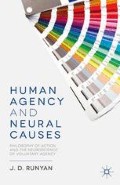Abstract
My analysis of human agency in Chapter 4 has implications for the compatibilist/incompatibilist debate about free will. As we will see in this chapter, the idea that one’s behaviour is necessitated by facts about the past and laws of nature (which is the entailment of a form of determinism I will call strict causal determinism) is incompatible with the idea we:
-
(i)
perform actions in the way we typically think we do, and talk about doing (i.e., such that something other than what was going to obtain on a particular occasion obtains);
-
(ii)
refrain;
-
(iii)
deliberate about performing an act or refraining with the possibility of being successful at what we decide to do; and
-
(iv)
purposively act—or act so that such-and-such obtains—and accomplish our aim.
Access this chapter
Tax calculation will be finalised at checkout
Purchases are for personal use only
Preview
Unable to display preview. Download preview PDF.
Notes
P. van Inwagen, The Problem of Evil (New York: Oxford University Press, 2008), 75.
J. M. Fischer, The Metaphysics of Free Will (Blackwell: Oxford, 1994), 9–10.
Or, as what is necessary without being logically necessary. Such connections are sometimes called ‘nomic’, ‘nomological’, or causal law, connections; e.g., G. H. von Wright, Causality and Determinism (Ithaca, NY: Cornell University Press, 1975), I.4
G. H. von Wright, ‘On the logic and epistemology of the causal relation’, in Causation, eds. E. Sosa and M. Tooley (Oxford: Oxford University Press, 1993), 108–9.
von Wright, Causality and Determination, I.4, III.5; von Wright, ‘On the logic and epistemology of the causal relation’, 106–7. Accordingly, as E. Sosa observes, ‘it is an essential feature of “nomological” accounts of causation that: (N) an event or state of affairs P (partially) causes (or is “a cause” or “causal factor” of) another Q only if there are actual (“initial”) conditions I and a law of nature L such that, by necessity, if P and I and L all obtain then Q must obtain, where the law L is essential in that P and I alone do not necessitate Q’ (my emphasis); E. Sosa, ‘Varieties of causation’, in Causation, eds E. Sosa and M. Tooley (Oxford: Oxford University Press, 1993), 234.
R. Harré, Laws of Nature (London: Duckworth, 1993), 9
R. Harré, ‘Laws of nature’, in A Companion to the Philosophy of Science, ed. W. Newton-Smith (Oxford: Blackwell, 2001), 213–3.
C. Hempel, ‘Aspects of scientific explanation’, in Aspects of Scientific Explanation and Other Essays in the Philosophy of Science (New York: The Free Press, 1965), 347
G. H. von Wright, Explanation and Understanding (Ithaca, NY: Cornell University Press, 1971), 15.
McKenna, ‘Compatibilism’, 1.3; cf. P. van Inwagen, An Essay on Free Will (Oxford: Oxford University Press, 1983), 16.
A recent exception being found in H. Steward’s work A Metaphysics for Freedom (Oxford: Oxford University Press, 2012).
H. Frankfurt, ‘Freedom of the will and the concept of a person’, The Journal of Philosophy 68 (1971), 8.
cf. H. Frankfurt, ‘Identification and externality’, in The Identities of Persons, ed. A. Rorty (Berkeley: University of California Press, 1976), 239–52.
S. Wolf, Freedom within Reason (New York: Oxford, 1990).
M. Alvarez, Kinds of Reasons (Oxford: Oxford University Press, 2010), 170.
For influential versions of this type of theory see J. M. Fischer and M. Ravizza, Responsibility and Control: An Essay on Moral Responsibility (Cambridge: Cambridge University Press, 1998)
I. Haji, Moral Appraisability (New York: Oxford University Press, 1998)
P. F. Strawson, ‘Freedom and resentment’, reproduced in Free Will, ed. G. Watson (Oxford: Oxford University Press, 2003), 72–93.
R. J. Wallace, Responsibility and Moral Sensibility (Cambridge, MA: Harvard University Press, 1994), cf. 85–103.
Cf. M. Smith, ‘Rational capacities, or: How to distinguish recklessness, weakness, and compulsion’, in Weakness of Will and Practical Irrationality, eds S. Stroud and C. Tappolet (New York: Oxford University Press, 2003)
K. Vihvelin, ‘Free will demystified: A dispositional account’, Philosophical Topics 32 (2004), 427–50
M. Fara, ‘Masked abilities and compatibilism’, Mind 117 (2008), 843–65.
Cf. D. Pereboom, ‘A compatibilist account of the epistemic conditions on rational deliberation’, The Journal of Ethics 12 (2008), 287–306.
I. Kant, Grounding for the Metaphysics of Morals, trans. J. Ellington (Indianapolis: Hacket, 1785/1981), AK IV 448
R. Taylor, Action and Purpose (Englewood Cliffs: Prentice Hall, 1966).
H. Bok, Freedom and Responsibility (Princeton: Princeton University Press, 1998), 107.
Author information
Authors and Affiliations
Copyright information
© 2014 Jason Douglas Runyan
About this chapter
Cite this chapter
Runyan, J.D. (2014). Compatibilist Concerns. In: Human Agency and Neural Causes. Palgrave Macmillan, London. https://doi.org/10.1057/9781137329493_5
Download citation
DOI: https://doi.org/10.1057/9781137329493_5
Publisher Name: Palgrave Macmillan, London
Print ISBN: 978-1-349-46060-1
Online ISBN: 978-1-137-32949-3
eBook Packages: Palgrave Social Sciences CollectionSocial Sciences (R0)

